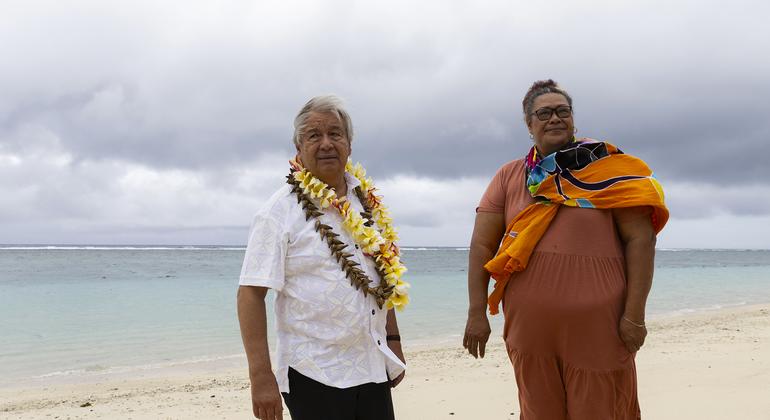United Nations Secretary-General Antonio Guterres recently visited the Pacific island nation of Samoa, where he witnessed firsthand the devastating effects of climate change on its residents. Guterres met with individuals who had been displaced from their homes due to the rising sea levels and coastal erosion caused by climate change. Despite the challenges faced by the people of Samoa, Guterres commended their resilience and refusal to be mere victims of this global crisis.
During a press conference at the UN House in Apia, the capital of Samoa, Guterres highlighted the urgent need for increased funding to support the efforts of vulnerable countries like those in the Pacific region. He stressed that while there have been positive gestures from wealthy nations towards developing countries, the actual financial support has not been sufficient to address the economic shocks caused by natural disasters linked to climate change.
Guterres pointed to the Loss and Damage Fund, which was agreed upon at the UN Climate Change Conference in Egypt in 2022, as a potential source of funding for countries dealing with the impacts of climate change. However, he noted that the promised contributions to this fund have not materialized, leaving vulnerable nations without the necessary resources to mitigate and adapt to the effects of climate change.
Additionally, Guterres mentioned the commitment made by developed countries in 2021 to double climate adaptation funding from the previously agreed amount of $100 billion per year. Despite this pledge, he emphasized that the increased funding has not been forthcoming, further exacerbating the challenges faced by countries like Samoa in combating climate change.
The UN Secretary-General called on all nations to honor their promises on climate finance and to prioritize a strong finance outcome at the upcoming COP meeting, where discussions on financial commitments beyond 2025 will take place. Guterres stressed the importance of ensuring that vulnerable countries receive the support they need to build resilience and adapt to the changing climate.
One of the key issues highlighted by Guterres during his visit to Samoa was the impact of rising sea levels on coastal communities. He described how the people of Samoa have been forced to repeatedly rebuild sea walls and relocate their homes due to the destructive forces of tsunamis, storms, and cyclones. Guterres witnessed firsthand the resilience and determination of the Samoan people in the face of these challenges.
The UN Secretary-General also addressed the financial inequalities that prevent many developing countries, including Samoa, from accessing the necessary funds to address the impacts of climate change. These nations often have to rely on borrowing from international lenders at higher interest rates, making it difficult for them to secure the financial resources needed for sustainable development.
To address this issue, the UN has worked with Small Island Developing States (SIDS) on the development of a new measurement of national income called the Multidimensional Vulnerability Index (MVI). This index takes into account the unique vulnerabilities of countries like Samoa and aims to provide them with access to concessional funding that is crucial for their sustainable development efforts.
Guterres called on the international community to consider the MVI when dealing with countries like Samoa to ensure that they receive the support they need to build resilience and adapt to the impacts of climate change. He emphasized the importance of addressing the structural inequalities in international finance that have long hindered the ability of vulnerable nations to access the resources needed to combat climate change effectively.
In conclusion, Guterres’ visit to Samoa shed light on the urgent need for increased funding and support for vulnerable countries grappling with the impacts of climate change. The Secretary-General’s call for action underscores the importance of global cooperation in addressing the challenges posed by climate change and ensuring a sustainable future for all nations, particularly those on the frontlines of this pressing crisis.









